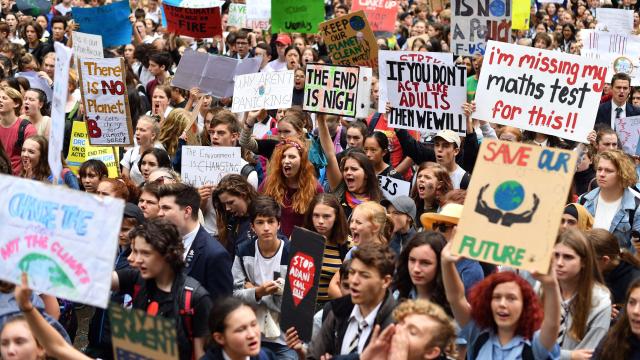If you spent even 10 minutes at one of the youth climate strikes that roiled the world pre-covid-19, you’d know the kids are incredibly upset at the lot the world is handing them. Now, scientists have categorised that anguish in a landmark study.
The findings, published in Lancet Planetary Health on Tuesday, show that kids and young adults in every corner of the globe are facing a mental health crisis driven by government inaction to end fossil fuel use. That will, in the words of the authors, lead to “significant, long-lasting” mental health impacts.
In candor that’s rare for scientific studies, the researchers said that while they hoped “for ‘significant’ results, we wish that these results had not been quite so devastating.” The analysis is based on 10,000 responses from people aged 16 to 25 in 10 countries around the world in both the Global North and South. The team gauged the kids’ sentiments around the impacts of the climate crisis as well as the causes.
The results are indeed devastating. Three-quarters of all respondents said the future is frightening, and 56% believed humanity is doomed. The strongest negative responses were from kids and young adults in developing countries, with Brazil, India, and the Philippines all tending to have more negative responses than countries like the U.S., Finland, and the UK. (Though, to be clear, we’re talking relatively. None of the results were particularly uplifting.) Perhaps most heartbreakingly, nearly 40% of the survey respondents said they were hesitant to have kids.
The kids also know where the blame lies: Governments that have created climate plans and then let emissions climb ever higher. Nearly two-thirds of those surveyed said governments are failing them and bullshitting about their achievements. Trust in governments was also wildly low.
“Every day that we wait, the kids and the others know that our peril deepens and that once we cross a few tipping points, there is no turning back,” said Lise Van Susteren, a psychiatrist with a private practice who co-authored the study.
What makes the findings striking is the sheer number of young people surveyed around the world. Other studies, such as an ongoing survey done by Yale and George Mason University, tend to focus on specific countries and involved a few hundred or maybe a thousand respondents. The breadth of the new study and the fact that climate anxiety is being seen around the world is a jolt to the system.
“To date, although qualitative researchers like myself know that ecological distress and climate anxiety are due to government climate inaction, we have not had the quantitative research basis to evidence that and demonstrate that this is a systematic issue following similar patterns around the world,” Blanche Verlie, a postdoctoral researcher at the Sydney Environment Institute at the University of Sydney, said in an email. She added that it shows clearly that the anxiety is due to climate injustice where those who have contributed the least to the problem — and in the case of those under 18, are disenfranchised from politically addressing it — are impacted the most.
Van Susteren also dwelled on that, saying that “this intergenerational injustice, this intergenerational aggression really is something that is indescribably wrong.” Outside of her practice, she has served as an expert witness for a case filed by children against the U.S. government for failing to act on climate change and infringing on their human rights. The case has wended its way through courts for years, with both Democratic and Republican presidents fighting against the case, and is in the midst of settlement negotiations. Other cases like it have popped up at the state level and in other countries. When I asked Van Susteren if the new study could be deployed in those cases, she said it’s absolutely possible.
“Somehow they have to see with numbers,” she said of judges and lawmakers. “So be it. Now we got the numbers.”
Other numbers are also piling up for those folks to look at. The International Energy Agency said all new fossil fuel exploration needs to stop next year. The Intergovernmental Panel on Climate Change found we are living through the impacts of climate change and they will worsen if the world doesn’t act this decade to end fossil fuel use and wind down greenhouse gas emissions. If the world fails to do that, it will unleash a tidal wave of climate damage worse than what we’ve already seen. And, as the new study makes clear, it will also worsen a mental health crisis and leave millions of today’s children scarred.
“The study comprehensively shows that if politicians are concerned about young people’s wellbeing, they now have clear evidence that the best thing they can do is to reduce greenhouse gas emissions and implement holistic climate justice policies, immediately,” Verlie said.
There’s one more important number: Millions of climate strikers have turned out around the world in recent years. Adults, too, are also awakening to the risks of climate change for future generations as well as the present ones suffering through the impacts.
“I think we’re getting closer to social tipping points,” Van Susteren said of those that would unlock a government more responsive to people’s demands than big business. “Let’s hope they happen in time.”
